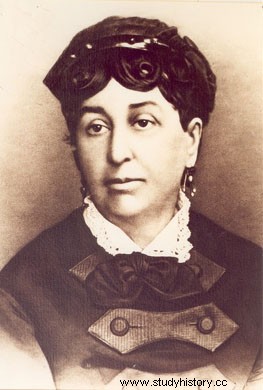Amantine Aurore Lucile Dupin (1804 – 1876) or Aurore Dupin, known by her pen name George Sand, is a French novelist and woman of letters. She was at the heart of the intellectual life of her time.
An unhappy marriage
 Daughter of Sophie Victoire Delaborde and Maurice François Dupin de Francueil, from an aristocratic line, Aurore was born in Paris July 1, 1804. Her father died when she was 5 years old and she grew up in Indre with her paternal grandmother, Madame Dupin, who hired a tutor to educate her granddaughter. This youth in the countryside, close to nature, will mark her writings, even if Aurore finishes her education at the convent of the English Augustinian Ladies in Paris.
Daughter of Sophie Victoire Delaborde and Maurice François Dupin de Francueil, from an aristocratic line, Aurore was born in Paris July 1, 1804. Her father died when she was 5 years old and she grew up in Indre with her paternal grandmother, Madame Dupin, who hired a tutor to educate her granddaughter. This youth in the countryside, close to nature, will mark her writings, even if Aurore finishes her education at the convent of the English Augustinian Ladies in Paris.
In September 1822, at the age of 18, she hastily married Baron François Casimir Dudevant, to fend off suitors interested in the fortune her family had left her. They have two children, Maurice and Solange, but they do not get along. In 1831, Aurore left her husband to follow her lover Jules Sandeau to Paris.
Scandalous writer
Aurore and Jules began a career together as journalists in Le Figaro under the pseudonym J. Sand. It's for his first solo novel, Indiana (published in 1832) that she took the pseudonym of G. Sand, then George Sand. In 1833, she published Lélia , whose immediate success opened the doors to the literary circles of the time. Very prolific, she then wrote one or more works a year until her death.
George Sand caused a scandal in his time. For convenience, for financial reasons and to access forbidden places (theaters, libraries, trials…), she often dresses like a man. These books are signed with a man's name (which many authors do) and the critics speak of them as of a man, on the same level as Balzac or Hugo. And she has many affairs, some of which influence her a lot. She notably frequented Mérimée, Musset, Chopin and Marie Dorval, actress of the Comédie Française. Her relationship with her lawyer, Michel de Bourges, converted her to republican ideas and socialism, and George Sand began to engage in politics, bonding with democrats.
During her last years, she settles into a relationship with a friend of her son, who is both her lover and her secretary. She continued to attend intellectual dinners, where she notably met Théophile Gautier. George Sand died at the age of 72, on June 8, 1876, of an intestinal obstruction. She never stopped writing.
